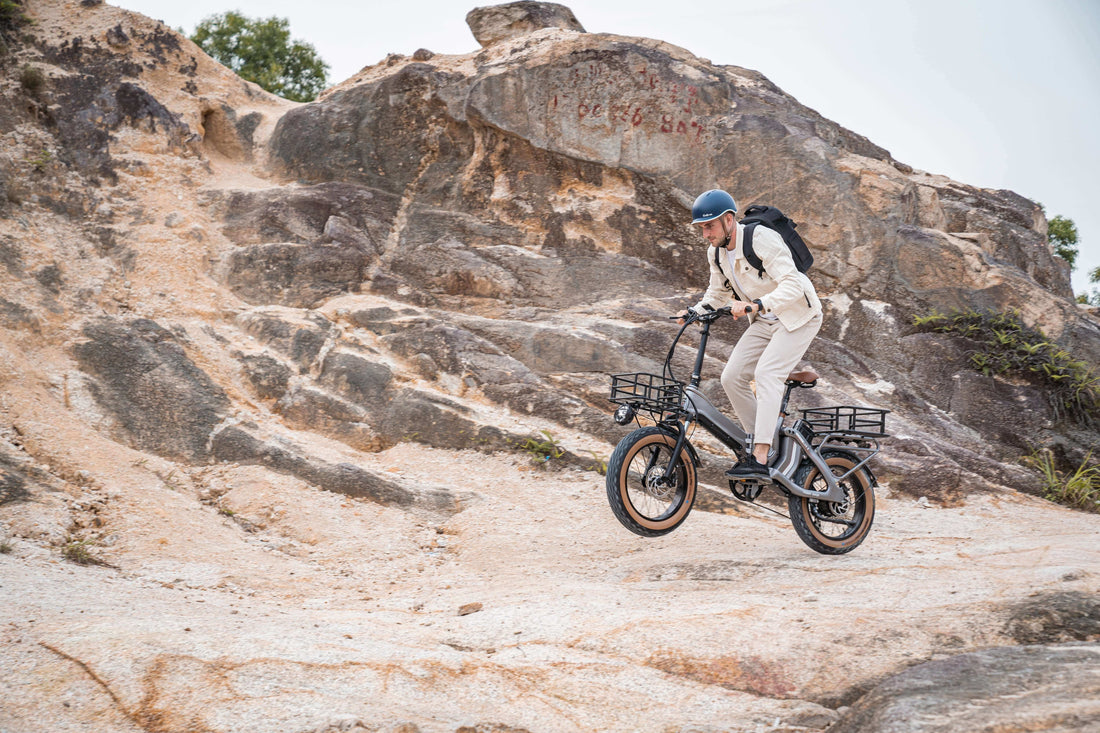Why Grass Field Riding is Revolutionizing E-Bike Adventures
The Appeal of Off-Path Exploration
Wide tires perform much better on grass surfaces than regular "skinny" tires. In the same way they accommodate sand and snow, the wider tires' spread helps prevent your bike from sinking into the grass. This fundamental advantage makes electric bikes particularly suited for grass field adventures, where traditional bicycles struggle with traction and stability.
Grass field riding offers unique benefits that traditional trail riding cannot match:
- Complete Freedom: No designated paths or crowded trails
- Natural Exploration: Direct access to untouched landscapes
- Skill Development: Enhanced balance and bike handling abilities
- Peaceful Solitude: Escape from busy cycling routes
Electric Advantage on Grass Fields
Electric bikes provide crucial advantages for grass field navigation. The consistent power delivery helps maintain momentum through varying grass densities, while the added weight actually improves traction on soft surfaces. Your Mihogo e-bike's motor assistance becomes invaluable when navigating challenging terrain that would exhaust traditional cyclists.
Mihogo Electric Bikes: Engineered for Grass Field Adventures
Model-Specific Capabilities
Mihogo Air750 Max: Your Premium Grass Field Explorer
- 750W powerful motor handles varied grass densities with ease
- 121-mile range enables extended field exploration
- Carbon fiber construction provides optimal weight distribution
- Perfect for serious off-road electric biking enthusiasts
MIHOGO ONE Utility EBIKE: The Ultimate Adventure Companion
- 750W motor with exceptional torque for grass climbing
- Industry-leading 167-mile range for multi-day field adventures
- Utility design accommodates camping gear and exploration equipment
- Ideal for bikepacking adventures in remote grasslands
MIHOGO RX 2.4: Versatile Field Explorer
- 500W motor perfect for moderate grass field riding
- 40-mile range suitable for local field exploration
- Folding design allows easy transport to remote field locations
- Excellent entry point for grass field riding
Mihogo Mini: Compact Field Adventurer
- 350W motor ideal for lighter grass field exploration
- 62-mile range covers substantial field territory
- Compact size navigates tight spots between vegetation
- Perfect for electric bike maintenance practice on easier terrain
Essential Grass Field Riding Techniques
Understanding Grass Field Dynamics
The main benefits of fat tires are that they can provide extra cushioning and stability when riding over rough surfaces like gravel or grass. This stability becomes crucial when navigating the unpredictable nature of grass fields, where surface conditions can change dramatically within meters.
Different grass types require adapted techniques:
- Short, Dense Grass: Maintain steady speed with moderate assistance
- Tall, Thick Grass: Use higher power settings and lower tire pressure
- Wet Grass: Reduce speed and increase braking distance significantly
- Mixed Vegetation: Constantly adjust power and line selection
Power Management for Grass Fields
Your Mihogo's power delivery system becomes crucial for successful grass field navigation:
ECO Mode: Ideal for firm, short grass where efficiency matters most NORMAL Mode: Perfect for standard grass field exploration SPORT Mode: Essential for thick vegetation and challenging climbs BOOST Mode: Reserve for emergency situations and extremely difficult terrain
Tire Pressure Optimization
Tire pressure makes a huge difference in how the bike rides. Lower pressure (10-15 PSI) creates a soft, grippy feel for trails, while higher pressure (20-25 PSI) makes the bike roll much faster on pavement.
For grass field riding:
- Short Grass: 18-22 PSI for optimal rolling efficiency
- Thick Grass: 12-16 PSI for maximum surface contact
- Wet Conditions: 10-14 PSI for enhanced grip
- Mixed Terrain: 15-18 PSI for versatile performance
Advanced Grass Field Navigation Strategies
Line Selection and Path Planning
Successful grass field riding requires constant decision-making about route selection. Look for natural paths created by wildlife or water drainage, which often provide firmer surfaces. Avoid obvious wet spots, thick vegetation clusters, and steep slopes that could challenge even your Mihogo's powerful motor.
Pro Technique: Use your e-bike's momentum strategically. Build speed on firm sections to carry through challenging soft spots, but always maintain control for sudden terrain changes.
Terrain Reading Skills
Develop the ability to read grass fields like a book:
- Color Variations: Darker areas often indicate moisture or softer ground
- Height Differences: Shorter grass typically offers firmer riding
- Wind Patterns: Grass movement reveals surface firmness
- Wildlife Paths: Animals naturally choose the best routes
Climbing Techniques for Grass Fields
When facing uphill grass field challenges:
- Weight Distribution: Keep weight slightly back to prevent front wheel slip
- Steady Cadence: Maintain consistent pedaling rhythm
- Power Management: Use higher assistance levels early rather than struggling
- Line Choice: Choose the most direct, firm route possible
Safety Considerations for Off-Path Adventures
Essential Safety Equipment
Grass field riding presents unique safety challenges requiring specialized preparation:
Navigation Tools: GPS devices with offline maps, compass, and emergency beacon Communication: Satellite communicator for remote area emergencies Protection: Helmet, protective eyewear, and puncture-resistant clothing Emergency Kit: First aid supplies, bike repair tools, and emergency shelter
Environmental Awareness
Responsible grass field riding requires understanding your impact:
- Avoid riding on protected or sensitive vegetation
- Respect private property boundaries
- Follow Leave No Trace principles
- Consider seasonal restrictions during nesting or growing periods
Weather Considerations
Grass field conditions change dramatically with weather:
- Dry Conditions: Dusty, firm surfaces with potential fire hazards
- Wet Conditions: Slippery surfaces with reduced traction
- Windy Conditions: Challenging bike control and navigation
- Cold Conditions: Battery performance reduction and hypothermia risk
Maximizing Your Mihogo's Grass Field Performance
Motor Optimization Techniques
Your Mihogo's motor performance directly impacts grass field success:
Smooth Power Application: Avoid sudden throttle inputs that can break traction Predictive Assistance: Anticipate terrain changes and adjust power proactively Battery Conservation: Use minimal assistance on easy sections to extend range Motor Protection: Avoid prolonged high-power operation in thick vegetation
Maintenance for Grass Field Riding
Regular maintenance becomes critical for grass field adventures:
Post-Ride Cleaning: Remove grass, seeds, and debris from drivetrain Chain Lubrication: Frequent relubrication due to increased contamination Tire Inspection: Check for embedded thorns or vegetation damage Electrical Connections: Verify all connections remain secure after rough riding
Battery Management in Remote Areas
Grass field exploration often takes you far from charging opportunities:
- Pre-Ride Planning: Calculate range requirements with safety margin
- Conservation Strategies: Use lower assistance levels when possible
- Emergency Reserves: Always maintain 20% battery for unexpected situations
- Temperature Protection: Shield battery from extreme temperatures
Building Your Grass Field Riding Skills
Progressive Skill Development
Start your grass field journey with manageable challenges:
Beginner Level: Short grass fields near roads with easy exit options Intermediate Level: Mixed terrain with varying grass heights and densities Advanced Level: Remote fields with challenging topography Expert Level: Multi-day expeditions across diverse grassland environments
Practice Exercises
Develop essential skills through focused practice:
- Balance Drills: Practice slow-speed maneuvering through cones
- Power Control: Master smooth acceleration and deceleration
- Line Selection: Navigate marked courses with optimal route choices
- Emergency Stops: Practice controlled stops on various grass surfaces
Environmental Impact and Responsible Riding
Minimizing Ecological Footprint
Some nature preserves and national forests may, however, prohibit riding on certain grassy areas. Always research local regulations and respect protected areas to ensure continued access for all riders.
Best Practices:
- Ride only where legally permitted
- Avoid sensitive ecosystems and wildlife habitats
- Stay on established paths when available
- Pack out all trash and minimize campfire impacts
Seasonal Considerations
Different seasons present unique opportunities and challenges:
- Spring: New growth requires extra care and lighter impact
- Summer: Dry conditions increase fire risk but improve traction
- Fall: Fallen leaves hide obstacles but create beautiful scenery
- Winter: Frozen ground provides firm surfaces but reduces battery life
Planning Your Grass Field Adventures
Route Planning Essentials
Successful grass field expeditions require thorough preparation:
Digital Tools: Use satellite imagery to identify potential routes Local Knowledge: Connect with local riders and landowners Backup Plans: Always have multiple exit strategies Weather Monitoring: Check forecasts and adjust plans accordingly
Essential Gear Checklist
Navigation: GPS device, paper maps, compass Communication: Cell phone, satellite messenger, whistle Safety: First aid kit, emergency shelter, signaling devices Bike Maintenance: Multi-tool, spare tube, pump, chain lube Personal: Water, food, weather protection, sun protection
The Future of Grass Field E-Biking
Technology Advances
The future of grass field riding looks increasingly exciting with advancing technology:
- Smart Traction Control: Automatic power adjustment for surface conditions
- Terrain Recognition: AI-powered assistance optimization
- Enhanced Battery Technology: Longer range and faster charging
- Integrated Navigation: Built-in GPS with grass field route optimization
Community and Conservation
The growing grass field riding community emphasizes responsible exploration and environmental stewardship. Join local groups that promote sustainable off-path riding and contribute to trail maintenance and conservation efforts.
Conclusion: Embrace the Grass Field Adventure
Electric bike grass field riding with Mihogo opens unlimited possibilities for exploration and adventure. Whether you choose the powerful Air750 Max for serious expeditions, the versatile ONE Utility for multi-day adventures, the practical RX 2.4 for local exploration, or the compact Mini for skill development, each Mihogo model provides the foundation for memorable off-path experiences.
The key to successful grass field riding lies in understanding your environment, respecting the landscape, and gradually building your skills. Start with shorter adventures close to home, develop your technique progressively, and always prioritize safety and environmental responsibility.
With proper preparation, the right Mihogo e-bike, and mastery of these techniques, grass fields transform from obstacles into gateways to adventure. Every ride becomes an opportunity to discover new landscapes, develop your skills, and experience the unique freedom that only off-path exploration can provide.
Ready to begin your grass field adventure? Explore the complete Mihogo electric bike collection and discover which model will carry you to your next off-path discovery.








